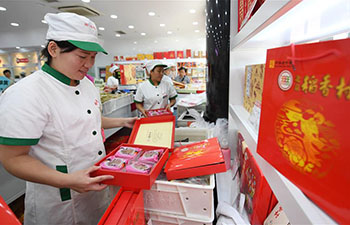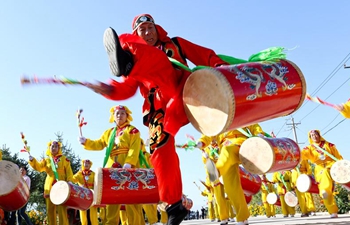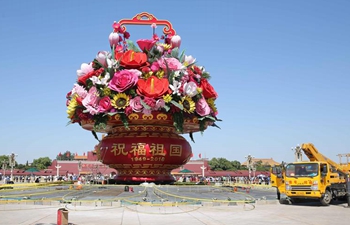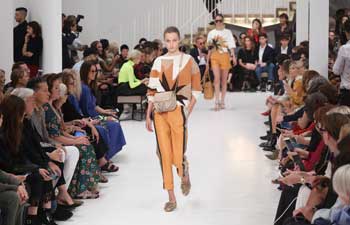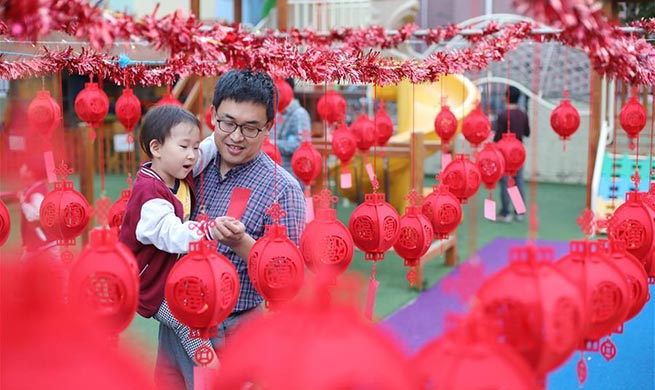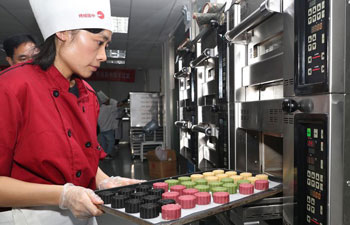BERLIN, Sept. 21 (Xinhua) -- Leading scholars from China and Europe have agreed to strengthen dialogue for mutual understanding and defend a rule-based multilateral world system amid global uncertainties.
Headed by Zhou Xiaochuan, China's former central bank governor and now president of China Society for Finance and Banking, a group of leading Chinese experts and former high-ranking officials toured around Europe from Monday to Friday, discussing economic and trade relations between China and Europe as well as the global multilateral system.
In a series of open seminars held during the tour, experts called for enhanced exchanges and cooperation in a bid to face the global challenges.
ENHANCING COOPERATION
Organized by China Center for International Economic Exchanges (CCIEE), the group of Chinese scholars visited Brussels, Geneva and Berlin.
In an opening speech at a seminar co-sponsored by Berlin-based Koerber Foundation and the CCIEE, Zhou called for advancing China-EU bilateral investment agreement and tapping great potential in cooperation in technology, innovation, exchanges of talent, and industry.
Bernt Berger, head of the Asia Research Program and senior fellow at German Council on Foreign Relations, told Xinhua that due to the unilateral policies adopted by the United States, Europe and China need to strengthen international system.
Experts said that both sides can work together to strengthen the WTO system and adapt its rules to the current times since the WTO is not a strategic alliance, but a partnership strengthening the international order.
Max Hanisch, an expert of the German Institute for Economic Research, said the United States is maybe trying to drive a wedge between China and Europe, but it really opens up the opportunity for the two sides to work together to find out how to further approach in the future.
STRENGTHENING MULTILATERALISM
The Chinese and European experts also vowed to defend the multilateral system, which is at risk due to the unilateral policies of the United States.
"We are all in the same boat," said Herman Van Rompuy, former prime minister of Belgium and former president of the European Council, while calling on countries to settle trade disputes in peaceful ways.
"Ending disputes, also trade disputes, ending conflicts, wars can only be achieved by negotiation and talks," he said.
Arancha Gonzalez, executive director of the International Trade Center in Geneva, told Xinhua that China's message was very clear -- multilateralism is a method to best address the multi-polar world.
"I can also subscribe to the view that to be effective in a multi-polar today, multilateralism is preferable to unilateralism," said Gonzalez.
Gonzalez said for the WTO, the most urgent challenge is how to make the dispute settlement body resume its full function as soon as possible.
Zhou hoped that in the WTO reform, Europe can listen to China's opinions, and make the global system rule-based and more convenient.
MORE EXCHANGES
After a roundtable discussion with European experts in Geneva, Zhu Guangyao, China's former vice finance minister, said both China and the EU hope to strengthen policy communication and coordination through think-tank exchanges.
"Through this very direct, frank and constructive dialogue, we have deepened our understanding and promoted mutual trust," he told reporters.
Wei Jianguo, vice chairman of the CCIEE, said that contrary to his expectation, European experts have such a deep misunderstanding about China and they had believed in the US false reports about China.
In various seminars, Chinese experts explained China's policies to their European colleagues, including China's state-owned enterprises, the intellectual property rights protection and other issues that Europe are concerned about.
Wei also called for more open and frank exchanges between Chinese and European think-tanks in a bid to provide solutions for both sides and clear up misunderstandings.
"The straightforwardness of our discussion was beyond my expectation," said Nora Mueller, Executive Director International Affairs of Berlin-based Koerber Foundation.
"It is good for strengthening mutual understanding," said Mueller.

